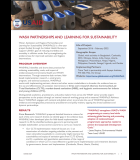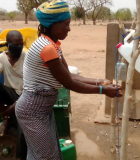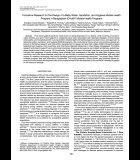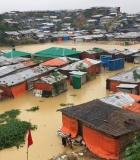Water, Sanitation, and Hygiene Plus – Bangladesh (WASHplus-Bangladesh)
Bangladesh is one of seven countries supported by the WASHplus Supportive Environments for Healthy Communities Project. This multi-year Cooperative Agreement (2010-2016) supportes healthy households and communities by creating and delivering interventions that lead to significant improvements in access, practices, and health outcomes related to water supply, sanitation, and hygiene (WASH) and household air pollution (HAP). WASHplus also has separate programs Benin, Kenya, Madagascar, Mali, Uganda, and Zambia.
Context
In Bangladesh, nearly all rural families burn solid fuels for cooking, primarily over very basic mud stoves, resulting in significant smoke exposure, which is closely associated with respiratory illness and premature death, and the release of greenhouse gases. While improved cookstove activities have been underway in Bangladesh for decades, a very small segment of homes have adopted them, despite government subsidy. The models available in Bangladesh are still limited, and those promoted have not improved significantly in design during that time despite dramatic innovations in technology and stove choice that have occurred elsewhere in the last 5-10 years. WASHplus is working on the ground on a two-phase activity to contribute to an improved cookstove market environment that encourages increased uptake of a range of improved stoves. A first step is to discover what barriers impede improved cookstove adoption and what strategies can be put in place to make improved cookstoves more accessible, affordable, and appealing to poor Bangladeshi consumers.
Phase one of the study is a multi-village consumer needs, preferences, and willingness to pay assessment. Consumers tested one of five improved stove models in their homes for three weeks and reported on likes, dislikes, difficulties, and suggested modifications in design or use. Two innovative willingness to pay assessments focused on financing or payment options hypothesized to be barriers to stove purchase for poor consumers. The second phase of WASHplus’s household air pollution work draws on lessons learned from its initial study and other local and regional experiences to develop an effective marketing and behavior change strategy, concept test a limited number of evidence-based approaches to increase the uptake of stoves, and develop practical “how-to” tools to contribute to the goals and results of USAID energy and health objectives in Bangladesh.
WASHplus is also working in four subdistricts in the southwestern coastal area of Bangladesh to improve access to much needed water, sanitation, and hygiene technologies in an area with high incidence of water-related diseases, poor nutrition indicators, an absence of WASH service provision, and a marginalized and environmentally vulnerable population. With USAID/Bangladesh funding, WASHplus is working through our resource partner WaterAid and local partner NGOs to increase access for poor and disadvantaged communities to safe WASH using locally appropriate technologies that address the challenges of this geographic area while strengthening community and local government capacity to provide and sustain facilities and services.
This three-year project is operating in Feed the Future focal districts and, in concert with USAID implementing partners, will coordinate and integrate WASH into nutrition activities as a strategy to reduce diarrhea and undernutrition.
Activity Description
• WASHplus will implement or rehabilitate appropriate and reliable water technologies.
• Implement the CLTS approach; explore the feasibility of launching a hand-washing device.
• Design a comprehensive behavior change strategy.
• Strengthen the capacity of community members (leaders, youth club members, WASH volunteers).
• Training of local government institutions, strengthen programs within FTF, stove trial study.
• Promote innovation and engage local institutions.
Actual Outcomes
• Deep tube wells installed w/ some additional rehabilitation
• One new water supply technology adapted (this language follows indicators)
• Community ignition in process (1,206 communities thru May 2014).
• Schoolteachers trained in WASH including MHM to accompany hardware inputs (348).
• Local government capacity strengthened, focus on O&M, planning, budgeting, representation
• New, upgraded, and renovated household latrines. (new = 3939, renovated/upgraded = 2775, provided to poorest of the poor - 283) reported in May 2014





